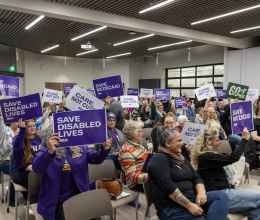
DENVER, CO - The American Civil Liberties Union today filed a complaint against three White House staffers for illegally ejecting Denver residents from a taxpayer-funded town hall with President Bush, even though they had done nothing to disrupt the event. The residents, who have been dubbed the “Denver 3” by the media, were singled out because of an anti-war bumper sticker on their car.
“The president does not have the authority to ignore the First Amendment simply because he disagrees with someone’s views,” said ACLU Senior Staff Attorney Chris Hansen, who is lead counsel in this case. “There has been a consistent pattern from the White House of handpicking which Americans are allowed entry to public events. That is unacceptable when taxpayers of all political stripes are footing the bill.”
Today’s complaint was filed in an ongoing lawsuit on behalf of Leslie Weise and Alex Young, two of the three people who were thrown out of the Denver event on March 21, 2005. For nearly two years, the White House has refused to admit its role in the incident. But Michael Casper, a Republican volunteer at the event who is also named in the ACLU lawsuit, said in a deposition that two White House employees directed him to throw out Weise and Young.
Casper identified the staffers as Steven Atkiss, then-Deputy Director of White House Advance, and James O’Keefe, lead advance staffer for the Denver event. Atkiss now serves as chief of staff for the U.S. Department of Homeland Security Customs and Border Protection. The ACLU also filed a complaint against Greg Jenkins, then-Director of White House Advance, whom the ACLU said is responsible for establishing the policy to eject anyone from presidential events whose views are perceived to be different from the president’s.
“The White House should not be in the business of censoring Americans,” said Mark Silverstein, Legal Director of the ACLU of Colorado. “Our clients were removed not because they were disruptive, but because they could ‘potentially’ engage in critical speech.”
Weise and Young had tickets to attend the Denver town hall on Social Security, but they were singled out after a staffer noticed a bumper sticker on Weise’s car that read, “No More Blood for Oil.” Weise was stopped upon entering the event, and warned by Casper that she had been “ID’d,” and that she would be arrested if she had any ill intentions. She was then allowed to enter, but Casper came back and forcibly removed Weise and Young after receiving official orders from O’Keefe and Atkiss.
“No one should be punished for peaceful expression of a viewpoint at a public event,” Weise said. “Our lawsuit seeks to ensure that this conduct will not happen again in America.”
The ACLU said that the Denver incident is not isolated. Other Americans have been forced to leave open-to-the-public presidential visits around the country. Individuals considered to have critical viewpoints were removed or excluded from Social Security town hall meetings in Arizona, North Dakota and New Hampshire.
The Denver case is Weise v. Jenkins and is in U.S. District Court for the District of Colorado. In addition to Hansen and Silverstein, attorneys in the case are Catherine Crump of the national ACLU and Martha Tierney and Jerremy Ramp of Denver-based law firm Kelly Haglund Garnsey & Kahn, who are acting as ACLU of Colorado cooperating attorneys.
